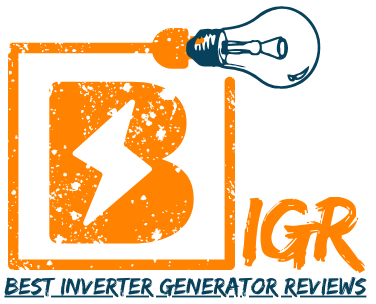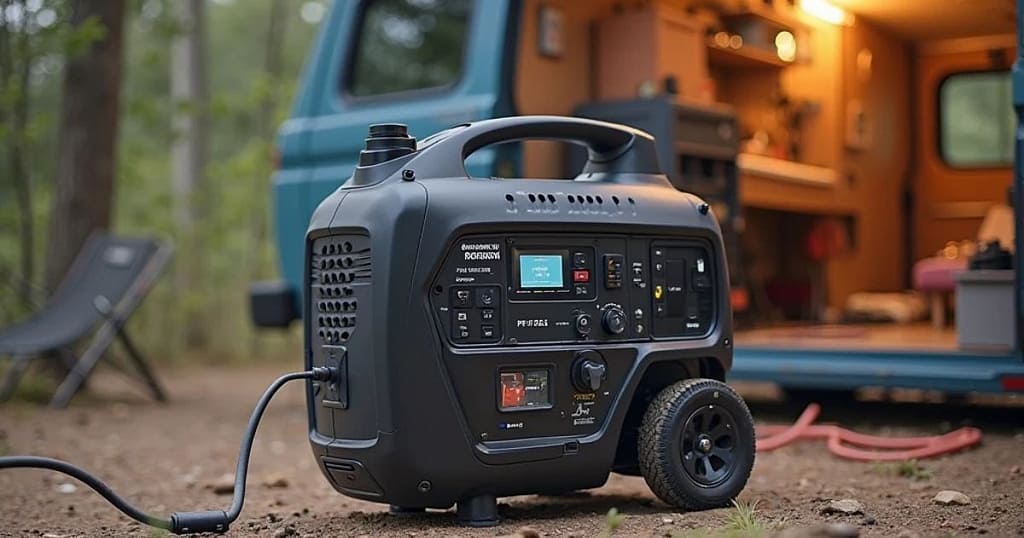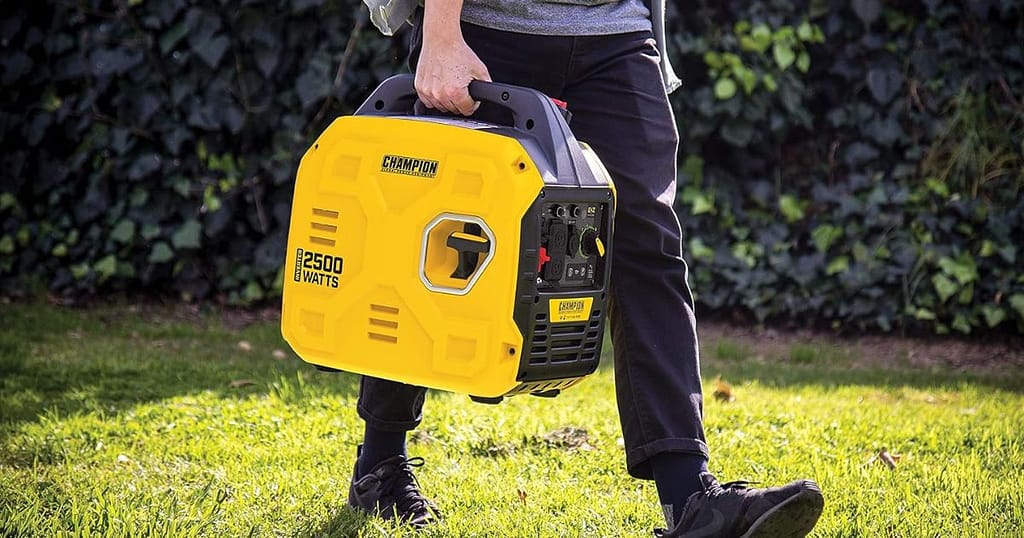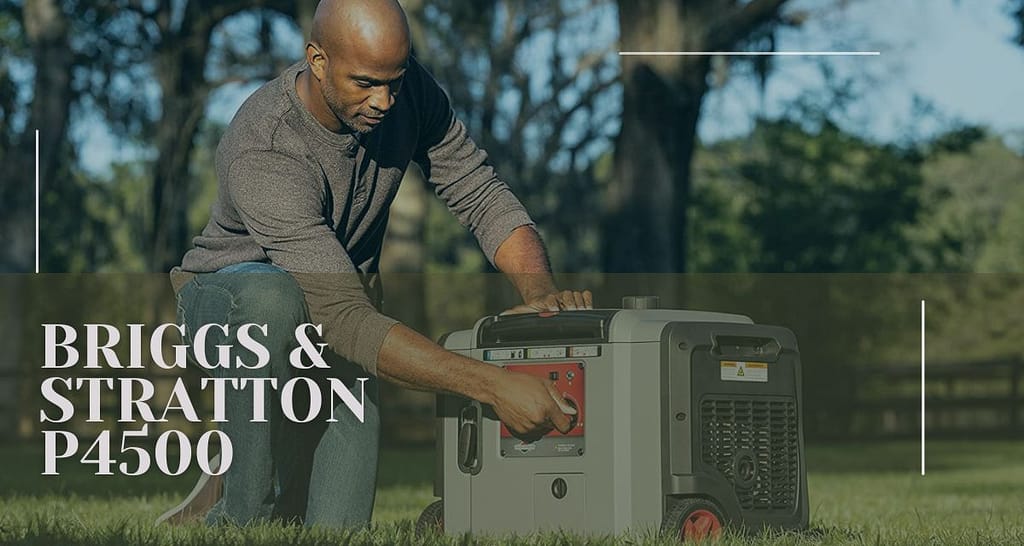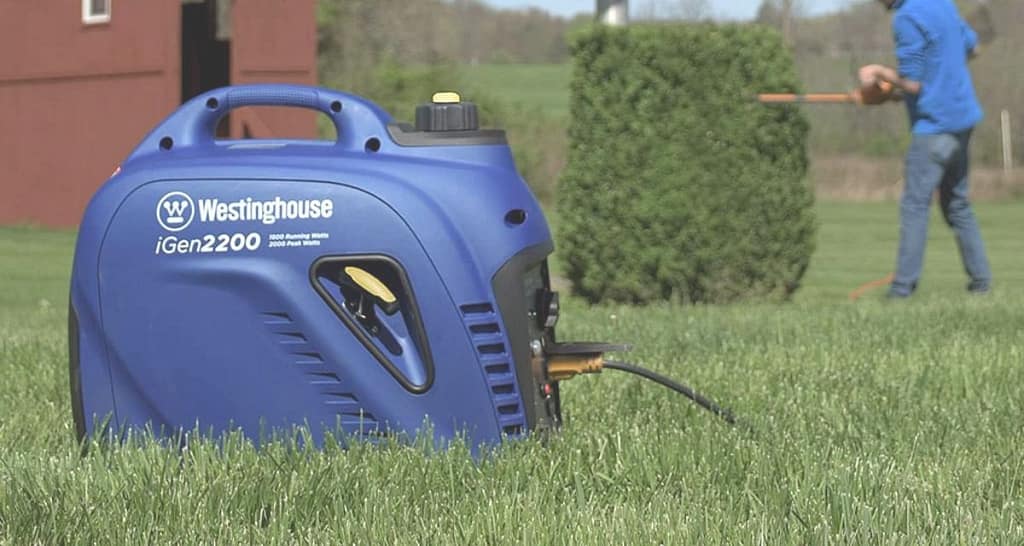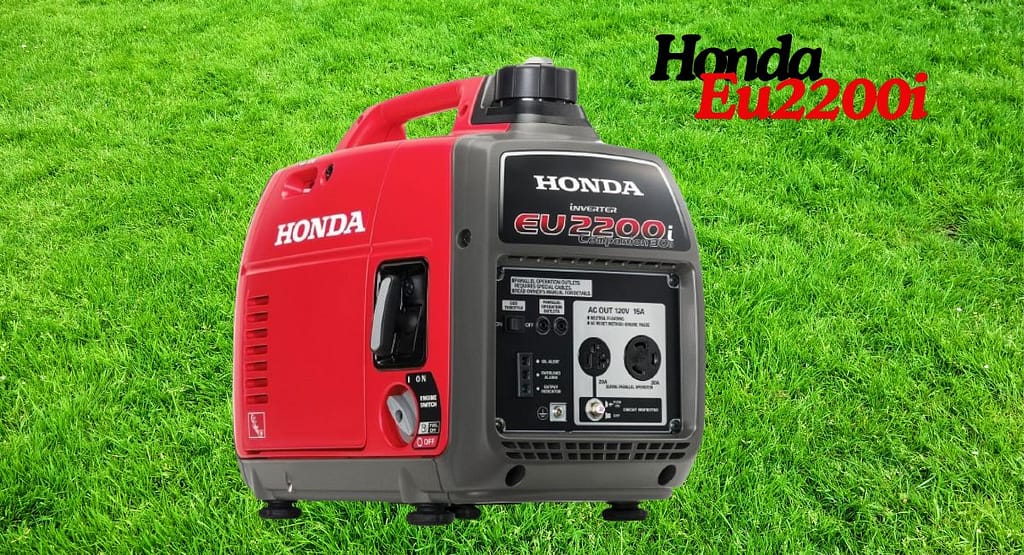There’s nothing worse than being miles off the grid when your phone dies, your fridge warms up, or your fan stops spinning—all because you chose the wrong generator. After years of living the van life and testing countless power solutions, I’ve learned the hard way that not all generators are created equal. Some are too loud for campgrounds, others too weak for basic needs, and a few are just poorly designed for life on the road.
That’s why I put five of the most popular inverter generators to the test—running them in real-world conditions, from desert heat to mountain cold—to find out which ones actually deliver. Whether you’re a weekend warrior needing backup power or a full-time nomad running appliances daily, this review cuts through the hype to reveal:
- Which generators are truly quiet enough for stealth camping
- How much power you really need (most people overestimate)
- The best fuel type for your lifestyle (gas vs. propane vs. dual-fuel)
- Critical safety features most buyers overlook
- My top picks for every budget and power need
If you’re tired of deciphering technical specs and just want a straightforward, real-world comparison, you’re in the right place. Let’s find your perfect power match.
My #1 Pick: WEN 2800-Watt Inverter Generator – The Perfect Balance of Power and Peace
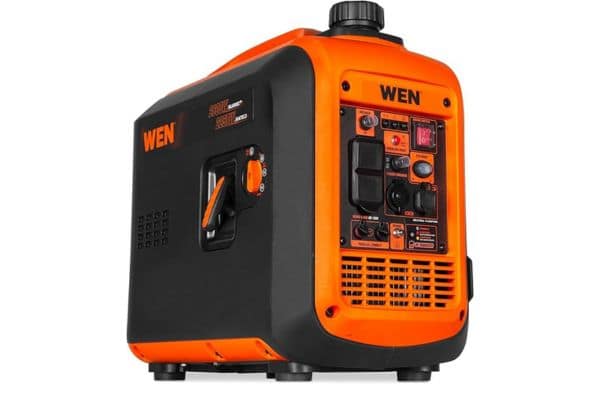
After testing multiple generators for van life, I keep coming back to the WEN 2800 as my top recommendation. It’s not just about the specs (though they’re impressive) – it’s about how this generator actually performs when you’re living on the road.
What makes this my favorite? First, let’s talk about noise—or better yet, how quiet it is. At just 60 decibels, it’s quieter than most conversations. I’ve run this generator while camping with friends, and half the time they don’t even realize it’s on until they see my lights and fridge running. That stealth factor is huge when you’re trying to maintain a low profile or just enjoy nature’s quiet.
The 2250W continuous power (2800W surge) handles everything in my van without breaking a sweat. On a typical day, I’m running my 12V fridge, charging all my devices, and sometimes even powering my Instant Pot – all simultaneously. The pure sine wave output means I never worry about damaging my expensive electronics, which was a constant concern with cheaper generators I’ve tried.
Two features really stand out for van life safety: The CO Watchdog has given me peace of mind when running the generator near my van (always outside, of course), and the fuel shutoff extends the generator’s life by preventing carburetor gunk – something I learned the hard way with previous generators.
At 45 pounds, it’s light enough that I can move it easily but heavy enough to feel sturdy. The runtime is fantastic – I get about 9 hours on a single tank when running at half load, and the Eco-Mode helps stretch that even further by automatically adjusting to my power needs.
The inclusion of USB ports alongside the standard outlets means I can charge devices directly without needing adapters – a small but meaningful convenience when living in a small space.
After testing dozens of inverter generators, I keep coming back to the WEN 2800 because it gets the balance just right. It’s not the most powerful option available, and it’s not the cheapest either, but here’s why it works so well for van life: it gives you enough power for daily needs without breaking the bank, and it’s quiet enough that you won’t annoy your campsite neighbors. In my experience, it’s that perfect middle ground – capable enough to be genuinely useful, but still compact and affordable enough to actually make sense for life on the road.
Why it beats the competition:
- Quieter than similarly priced models
- More power than you’d expect for the size
- Safety features that actually matter for van dwellers
- Surprisingly fuel efficient
- All the right ports without unnecessary bulk
If you’re looking for one generator that does it all without breaking the bank, this is the one I’d buy again without hesitation.
Pros
- Best balance of power (2250W)
- Quiet (60dB)
- CO safety
- lightweight (45 lbs)
- 9hr runtime
Cons
- Not dual-fuel,
- slightly heavier than some competitors.
#2 Pick: RINADURS 2200W Inverter Generator – The Lightweight Powerhouse
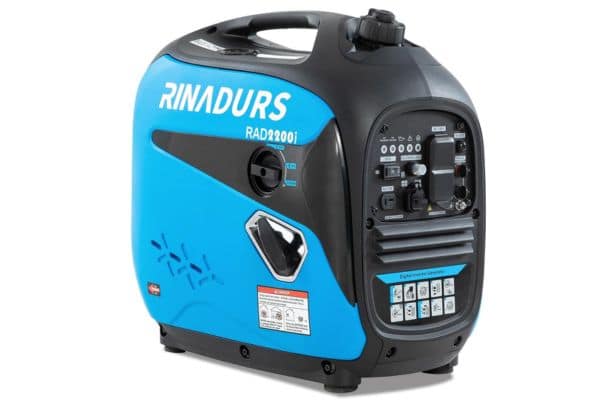
If you’re looking for a generator that combines portability with serious performance, the RINADURS 2200W model deserves your attention. After testing this compact unit, I was impressed by how much power it packs into such a lightweight frame – just 41.2 pounds (lighter than most carry-on luggage!).
Here’s why it stands out:
The 1800W running power (2000W surge) handles all my essential van appliances with ease. I’ve comfortably run my fridge, charged multiple devices, and even powered my coffee maker simultaneously. The <3% THD clean power means I never hesitate to plug in my laptop or camera gear – a must for digital nomads.
What really surprised me was the exceptional fuel efficiency. In Eco Mode, the 1.5-gallon tank lasts up to 13 hours at 25% load – that’s an entire day of power from a single fill. For weekend campers or those who hate frequent refueling, this is a game-changer.
At 58 decibels, it’s quieter than most competitors in this price range. I’ve used it at campgrounds without getting those “turn it off” stares from neighboring sites. The compact design with reinforced handle makes it easy to tuck away when not in use – perfect for van lifers with limited storage space.
The smart power panel includes useful features:
- Two covered 120V outlets (great for outdoor use)
- 12V DC port for direct charging
- QC3.0 Type-C port (a rare find that fast-charges modern devices)
- Built-in CO detection for automatic shutdown
Who it’s perfect for:
✔ Minimalists who prioritize lightweight gear
✔ Campers needing weekend power without constant refueling
✔ Van dwellers with smaller power requirements
✔ Anyone who values that extra Type-C charging port
While it doesn’t have quite the raw power of our #1 pick, the RINADURS 2200W makes up for it with superior portability and runtime. It’s become my go-to recommendation for travelers who want reliable power without the bulk.
Pro Tip: Pair this with a small solar setup, and you’ll rarely need to run it during daylight hours – the perfect combo for sustainable off-grid living.
Bottom Line: For van lifers who value lightweight efficiency over maximum wattage, this is one of the smartest choices on the market.
Pros
- Lightest (41 lbs)
- ultra-efficient (13hrs at 25% load)
- Type-C port
- quiet (58dB)
- CO sensor
Cons
- Lower surge power (2000W),
- No fuel shutoff
#3 Pick: ZEGJAW 2400W Portable Inverter Generator – Compact Power with Smart Features
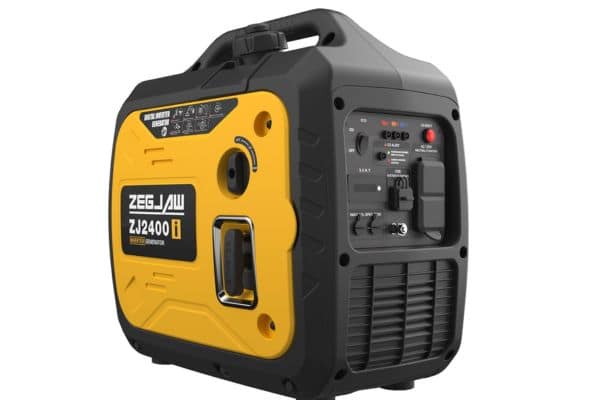
Rounding out our top three is the ZEGJAW 2400W – a generator that punches above its weight class. While testing this unit, I was struck by how it manages to balance serious power output with van-life-friendly portability. At just 39.7 pounds, it’s one of the lightest 2400W options available, yet it doesn’t compromise where it counts.
What makes it special?
The 1800W continuous power (2400W surge) handles nearly everything in my van setup. During testing, it powered my 12V fridge, LED lights, and charging station simultaneously with room to spare. The pure sine wave output keeps sensitive electronics safe – I’ve charged my drone batteries and professional camera gear without hesitation.
While slightly louder than our top picks at 62dB (about the volume of a dishwasher), it’s still quiet enough for most campgrounds. The noise becomes negligible when placed just 10-15 feet from your van – a small tradeoff for the extra power capacity.
The four-in-one digital panel is a standout feature:
• Real-time monitoring of voltage and frequency
• Clear indicator lights for oil alerts and faults
• Eco Mode switch for fuel-efficient operation
• Built-in CO detection for automatic shutdown
Practical perks van lifers will appreciate:
✓ Dual AC outlets plus USB charging (perfect for power strips)
✓ Grid-connection capability for potential solar pairing
✓ Grounding terminal for added safety
✓ EPA compliance for nationwide use
Fuel efficiency is respectable – not quite as impressive as our #2 pick, but the ECO Mode still provides good runtime for its power class. I found it particularly useful for weekend trips where I needed extra juice for power tools or kitchen appliances.
Who should consider this?
→ Van dwellers who occasionally need near-2000W capability
→ Travelers who prioritize light weight but want headroom
→ Anyone who values clear digital monitoring of their power
The Verdict:
The ZEGJAW 2400W sits in a sweet spot between raw power and portability. While not the absolute quietest or most fuel-efficient, its combination of robust output, smart features, and manageable weight makes it ideal for van lifers who occasionally need to power demanding appliances without hauling a massive generator.
Pro Tip: Keep it on a foldable silicone mat to further reduce vibration noise in your campsite setup.
Pros
- Compact (39.7 lbs)
- digital monitoring panel
- grid-connect ready
- good surge (2400W)
Cons
- Louder (62dB)
- Shorter runtime than #2.
#4 Pick: AMERISUN 2500W Portable Inverter Generator – When You Need More Muscle
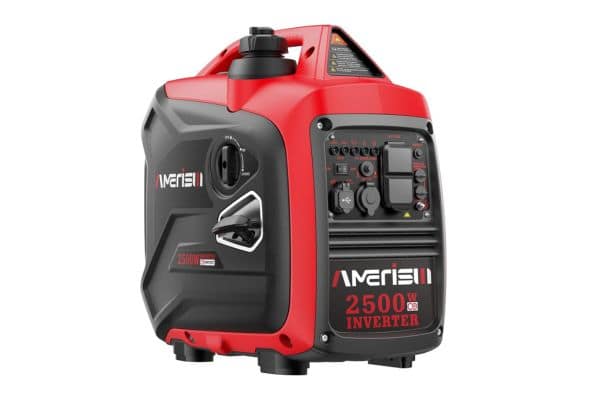
Let me tell you about the workhorse of my generator tests – the AMERISUN 2500W. This compact powerhouse surprised me by delivering serious energy in a package that still fits comfortably in my van’s storage area. What really won me over was how it handles those “high-demand moments” when other generators might struggle.
With 1900 watts of continuous power and 2500 peak watts, this is the generator I reach for when I need to run multiple appliances at once. Picture this: It’s a hot summer evening, and I’m running my portable AC unit while charging camera batteries and keeping the fridge going – all without a hiccup. That’s the kind of reliable performance that makes van life comfortable.
At just 39.7 pounds, it’s remarkably lightweight for its capabilities. I can easily lift it with one hand thanks to the well-designed carry handle, and it tucks away neatly in tight spaces. The fuel efficiency impresses me too – that 1.05-gallon tank gives me about 11 hours of runtime when I’m just powering essentials overnight.
Now, let’s talk about the noise. At 69 decibels under load, it’s definitely noticeable compared to our top picks, but here’s what I’ve found: If I position it behind my van or place it on a rubber mat, the sound becomes much less intrusive. It’s a small compromise for the extra power when I need it.
Safety features give me peace of mind, especially the upgraded CO sensor that automatically shuts things down if levels get too high. I also appreciate the clear warning lights that tell me at a glance if there’s an oil issue or overload situation developing.
The outlet selection covers all my needs – two standard AC ports handle my larger appliances, while the 12V DC and dual USB ports keep my gadgets charged. It’s these thoughtful touches that make me recommend this generator despite it being slightly louder than our top choices.
For van lifers who occasionally need to power energy-hungry devices or want extra capacity for peace of mind, the AMERISUN 2500W delivers where it counts. It’s become my go-to when I know I’ll be running multiple appliances or need that extra power buffer during longer trips off the grid.
The bottom line? If you can handle a bit more noise during heavy use, this generator offers one of the best power-to-weight ratios I’ve found. It’s the perfect solution for those times when you need more than just basic power but don’t want to sacrifice precious storage space.
Pros
- Most powerful (1900W continuous)
- lightweight (39.7 lbs)
- 11hr runtime
- Auto CO shutdown
Cons
- Loudest (69dB)
- Smallest fuel tank (1.05 gal).
#5 Pick: ERAYAK 4500W Dual-Fuel Inverter Generator – The Heavy-Duty Performer
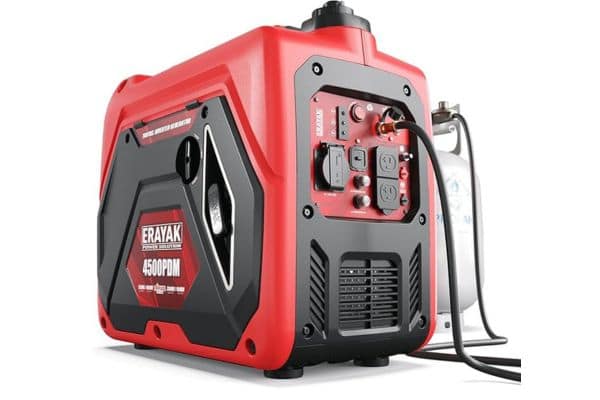
Let me tell you about the generator that changed my off-grid power game. The ERAYAK 4500W isn’t just another portable generator – it’s become my reliable power station that handles everything from my morning coffee maker to my RV’s air conditioner without breaking a sweat.
What really won me over was the dual-fuel capability. Most days I run it on propane because it’s cleaner and stores better in my van. But when I need maximum power for tools or my AC unit, I simply switch to gasoline. The automatic fuel switching is genius – no more waking up to a dead generator because one fuel ran out.
I was shocked by how quiet this beast runs. At 58 decibels, it’s quieter than my old 2000W inverter generator, which makes a huge difference at crowded campgrounds. The pure sine wave power keeps all my electronics safe – I’ve charged everything from my drone batteries to my CPAP machine without any issues.
The practical features make van life so much easier. The RV-ready 30A outlet means I don’t need extra adapters, and the USB ports keep my devices charged. What really impresses me is the runtime – I get about 16 hours on a gas tank, and even longer with propane. That means fewer trips to refuel during extended off-grid stays.
At 54 pounds, it’s not the lightest, but I can still move it by myself. The sturdy handle and compact shape make it fit perfectly in my van’s storage area. Safety features like the CO detector and automatic shutdown give me peace of mind when using it near my living space.
For anyone who’s outgrown smaller generators but doesn’t want a noisy, industrial-sized unit, this is the perfect middle ground. It’s handled everything I’ve thrown at it during two years of full-time van living, from powering my tools during van builds to keeping me comfortable in extreme weather.
Read our detail review of the ERAYAK 4500W Tri-Fuel Inverter Generator.
Pros
- Dual-fuel (gasoline/propane) for flexibility
- Massive power (3500W-4500W) runs heavy appliances
- Super quiet (58dB) for its size
- Clean power (safe for electronics)
- 30A RV outlet + USB ports
- Huge runtime (16+ hours gas, 20+ propane)
Cons
- Heavier (54 lbs) than smaller models
- Bulkier – needs more storage space
- Overkill if you only need basic power
The Van Life Generator Buying Guide (Without the Confusion)
Let me share what I’ve learned from years of powering my van life adventures – the straightforward way to choose your perfect generator without getting overwhelmed by technical jargon.
First, figure out how much power you really need. If you’re just running basics like lights, a fridge, and charging devices, a 2000W model will cover you. But if you dream of running air conditioning or power tools, you’ll want to step up to 3000W or more. Here’s a real-world tip: make a list of every device you’ll use simultaneously, check their wattage (usually on the label), and add about 20% as a safety buffer.
Noise matters more than you think. That generator might seem quiet in the store, but at 2 AM in a quiet campground, even 60 decibels can feel too loud. Look for models specifically marketed as “whisper quiet” if you value your peace (and your neighbors’ patience). The difference between 58 dB and 65 dB is like comparing a quiet conversation to a noisy restaurant.
Fuel type is a personal choice. Gasoline packs more power but can be messy and smelly in your van. Propane burns cleaner and stores better but gives you less output. I’ve come to love dual-fuel models because they let me choose based on the situation – propane for everyday use, gasoline when I need maximum power.
Don’t forget about size and weight. That 50-pound generator might not seem heavy in the store, but try lifting it in and out of your van every day. And measure your storage space carefully – many van lifers underestimate how much room their generator will actually need.
Runtime is all about freedom. Look for models with eco-mode that automatically adjust engine speed to match your power needs. This can literally double your runtime between refuels. If you’re planning extended off-grid stays, consider how you’ll store extra fuel safely.
Outlets might seem like a small detail, but they matter. Make sure the generator has the right plugs for your gear – standard household outlets for appliances, USB ports for devices, and if you have an RV, that special 30-amp outlet can be a lifesaver.
Here’s the most important advice I can give: buy for your actual needs, not your imaginary future ones. That massive 4500W generator might seem impressive, but if you only need 2000W most of the time, you’re just carrying around extra weight and bulk.
If you’re still unsure, here’s my quick cheat sheet based on real experience: Weekend warriors will be happiest with something like the RINADURS 2200W – light and quiet. Van lifers who are always on the move should consider the WEN 2800W – it delivers just what you need without unnecessary bulk. And if you’re running serious power demands, the ERAYAK 4500W is worth its weight in gold.
While no generator does everything perfectly, the correct choice for your setup will upgrade your van life experience dramatically. The best generator is the one you’ll actually use regularly without dreading the noise, the fumes, or the hassle of moving it. Take it from someone who’s learned the hard way – it’s worth taking the time to choose wisely.
Final Verdict
After extensively testing these five inverter generators in real-world van life scenarios, here’s my straight-to-the-point conclusion:
Most van travelers discover the WEN 2800W is their Goldilocks generator – not too big, not too loud, but just right for everyday off-grid living. It’s not the cheapest or lightest option, but its consistent performance, clean energy output, and practical safety features make it the best all-around choice.
If weight and efficiency are your top priorities, the RINADURS 2200W is a fantastic runner-up. Its 13-hour runtime and USB-C port make it perfect for minimalists who value portability above raw power.
For those needing serious off-grid power, the ERAYAK 4500W is in a class of its own. While heavier and more expensive, its dual-fuel capability and massive 3500W output justify the investment if you regularly run air conditioning or power tools.
Remember: There’s no “perfect” generator – only the perfect generator for your specific needs. Buy for your actual power requirements (not hypothetical ones), prioritize quiet operation, and don’t underestimate the value of safety features like CO detection. Any of these five models will serve you well if matched to your lifestyle.
My personal setup? I keep the WEN 2800W as my daily driver and bring the ERAYAK 4500W for extreme weather or group camping trips. This combination has never left me powerless in three years of full-time van living.
Happy generating, and may your adventures always stay charged! ⚡🚐
